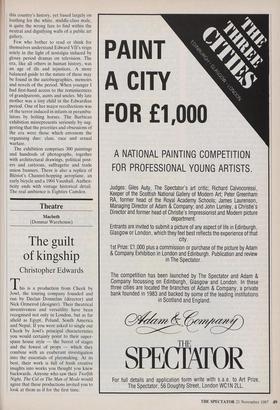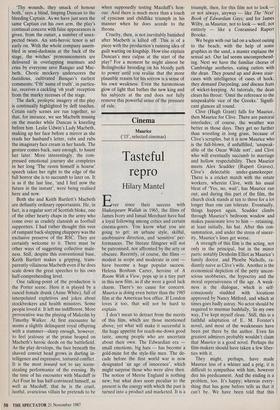Theatre
Macbeth (Donmar Warehouse)
The guilt of kingship
Christopher Edwards
This is a production from Cheek by Jowl, the touring company founded and run by Declan Donnelan (director) and Nick Ormerod (designer). Their theatrical inventiveness and versatility have been recognised not only in London, but as far afield as Egypt, Poland, South America and Nepal. If you were asked to single out Cheek by Jowl's principal characteristics you would certainly point to their super- spare house style — the barest of stages and the fewest of props — which they combine with an exuberant investigation into the essentials of playmaking. At its best, their work is full of fresh creative insights into works you thought you knew backwards. Anyone who saw their Twelfth Night, The Cid or The Man of Mode would agree that these productions invited you to look at them as if for the first time. 'Thy wounds, they smack of honour both,' says a blind, limping Duncan to the bleeding Captain. As we have just seen the same Captain cut his own arm, the play's continual concern with false appearances is given, from the outset, a number of unex- pected twists. An anti-heroic tenor is set early on. With the whole company assem- bled in semi-darkness at the back of the stage, the witches' pronouncements are delivered in overlapping murmurs and cries by everyone save Banquo and Mac- beth. Choric mockery underscores the fastidious, cultivated Banquo's earliest comments: Ttte name of truth', in particu- lar, receives a cackling 'oh yeah' reception from the murky recesses of the stage.
The dark, proleptic imagery of the play is continually highlighted by deft touches. Cetain early scenes are run together, so that, for instance, we see Macbeth musing on the murder while Duncan is kneeling before him. Leslie Udwin's Lady Macbeth, making up her face before a mirror as she reads her husband's letter, rubs and rubs the imaginary face cream in her hands. The gesture comes back, sure enough, to haunt her later. More interestingly, the com- pressed emotional journey she completes in her long 'The raven himself is hoarse' speech takes her right to the edge of the full horror she is to succumb to later on. It is as if the last line, 'and I feel now the future in the instant', were being realised here and now.
Both she and Keith Bartlett's Macbeth are defiantly ordinary opportunists. He, in fact, is a regular sort of Scottish bloke, one of the other hearty chaps in the army who come over as crudely clannish as football supporters. I had rather thought this vein of rampant back-slapping chappery was the exclusive preserve of the RSC. They are certainly welcome to it. There must be other ways of suggesting collective male- ness. Still, despite this conventional base, Keith Bartlett makes a gripping, trans- parently villainous Macbeth even if he does scale down the great speeches to his own half-comprehending level.
One talking-point of the production is the Porter scene. Here it is played by a rancid female drunk (Anne White), full of interpolated expletives and jokes about stockbrokers and health ministers. Some people loved it. It left me indifferent. More provocative was the playing of Malcolm by Timothy Walker. At first encounter he seems a slightly delinquent royal offspring with a stammer—sharp enough, however, to feel jealousy at the praise heaped on Macbeth's heroic deeds on the battlefield. As the play develops, the face beneath the shaved convict head grows in darting in- telligence and expressive, tortured conflict. It is the most inward not to say scene- stealing performance of the evening. By the time of his encounter with Macduff in Act Four he has half-convinced himself, as well as Macduff, that he is the cruel, lustful, avaricious villain he pretends to be when supposedly testing Macduff's hon- our. And there is much more than a touch of cynicism and childlike triumph in his manner when he does accede to the throne.
Cruelty, then, is not inevitably banished after Macbeth is killed off. This is of a piece with the production's running idea of guilt waiting on kingship. How else explain Duncan's mea culpas at the start of the play? For a moment he might almost be Bolingbroke brooding on his bloody path to power until you realise that the more plausible reason for his sorrow is a sense of his own weakness. Even the harmonious glow of light that bathes the new king and his subjects at the end does not fully remove this powerful sense of the pressure of rule.



































































 Previous page
Previous page